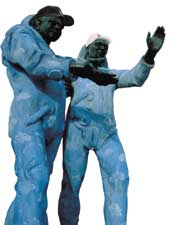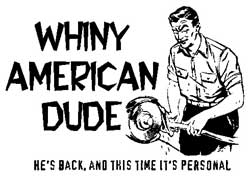Cigarette smoke hung thick in the air. The lights were dim, but the atmosphere was explosive. The revolutionaries huddled over cold coffee and tried to keep their emotions in check to avoid useless ranting about the status quo.
They swapped plans on how Czech society should be changed and how this mother cell would start the chain reaction. They originated from various countries on different continents, but all chose to live in Prague. However, they don’t plan to accept Prague the way they found it. They aim to sow the seeds of a revolution. Don’t count on it being velvet.
More like burlap. The final goal of these revolutionaries is even more daunting than changing the government – they want to change the way people think about foreigners in the Czech Republic. But despite their hushed plans and fiery rhetoric, there’s no reason to fear them or bring back the StB to stamp out this “enemy within. ” This group of foreigners is not an international collection of agents provocateurs trying to subvert the state: these foreigners just want to fit in.
When I heard the way these people were talking at their meeting back in January, their goal of integrating non-Czechs into the mainstream of society truly did seem revolutionary. Since 1990, the population of foreigners living in the Czech Republic, particularly in Prague, has expanded at a rapid pace.
The Ministry of the Interior recognizes 200,000 long term foreign residents, but NGOs in the field claim that the number here illegally could be between two and four times that figure. If the NGOs are correct, the total population of non-Czechs in the Czech Republic could approach ten percent of the total. And still nobody seems to recognize or properly understand this population.
What about all the different colored faces speaking all those different languages on the streets of Prague? They’re not all tourists. Not all the foreigners here congregate in front of the astronomical clock every hour to watch the little glockenspiel go around.
This group of “revolutionaries” who were trying to put together the core of a nationwide network for the protection of minorities in the CR (under the auspices of an already existing NGO called Slovo 21) felt that the average citizen was sadly ignorant of the situation of foreigners here. Insofar as the typical Jan Novak thinks of these “new” foreigners – as opposed to the “old” national minorities of Poles and Slovaks – he is most likely to consider them criminals.
This reminded me of my experiences teaching Czech teenagers. One of my favorite assignments was making them write a paragraph about foreigners living in their country. They often chose a “divide and classify” style of paragraph. They divided foreigners into two or three different categories.
The first category was almost always foreign businessmen, Westerners who came to the CR to invest their time and money in promising Czech ventures. The second category was foreign “byznysmeni”, scary men from Russia or Ukraine who came to work illegally, raise the crime level, and generally rob the CR of everything it had. As a third category of “foreigners,” many students would cite the Roma, who some students wrote should just go “home.”
My Czech teenagers were not intolerant people.
Aside from the ones who sat in the back and talked all the time, they were really very sweet. It was just clear that they had not been educated about the foreigners here and had also been woefully misinformed by a number of popular myths. Myth Number One is that foreigners in the CR can be categorized so easily. Sitting in on the meeting of the “revolutionaries” would clearly debunk this myth.
One girl was raised in Morocco by a Czech mother and speaks fluent Czech, but has an exotic appearance and unfamiliar last name that prevent her from truly “being Czech.” Another was a refugee from Bosnia who has now lived almost half his life in the Czech Republic but still has a slight South Slavic accent that attracts suspicious glares and prompts the occasional taxi
driver to try to rip him off. A third came from Angola eight years ago to get a Czech education and, despite the fact that he studies at the most prestigious university in the country and works as a manager, his dark skin will prevent him from ever being accepted as a regular hard-working citizen here. The foreigners here come from far and wide for a variety of reasons.
The second myth that needs to be revised is that the Western foreigners come here with good intentions to invest valuable Western currencies and import Western technology and know-how, while the scary immigrants from the East come here just to “import” crime and “export” the Czechs’ hard earned money.
The fact of the matter is that people from the East, West, North, and South alike are moving all over the globe these days. Their circumstances are all different, but their final goal is always the same: simply to improve their station in life. One of the primary reasons why more of the Eastern immigrants are working illegally is because the Czech government has made it more difficult for them to obtain permission to work.
If you take a little trip to the Czech Work Office, the “Urad prace”, you’ll see a large bulletin board in the hallway with instructions on how to apply for a work permit. Then you’ll see a completely different bulletin board with instructions for Ukrainian applicants, even though they hardly need a whole bulletin board to outline the procedure.
The message is quite clear: don’t even bother.
Czech officials, just like many other governments around the world, have not yet come to terms with the reality that making it difficult for people to obtain work permission does not stem the tide of economic migrants. Rather it simply forces these people to work illegally on the margins of society in a shady and dangerous world where they enjoy virtually no rights.
Oh yeah, and as for myth number three… the Czech Roma are at home. Get used to it.
This misinformation of the public was one of the primary topics discussed by the foreign “revolutionaries” at their meeting. They talked about how the media perpetuate these popular myths. Interested by their claims I decided to pay closer attention to the domestic news section of one of the Czech Republic’s most respected dailies, Lidove Noviny, for the next couple weeks. And while I find it difficult to accuse this newspaper of any bias, I do see their point.
On February 5th I found a story about how several Czech bank robbers had recently spoken Russian while holding up a bank in Prosek. It was a very funny article finishing with the sentence, “As long as the robbers don’t shoot anybody while doing their ‘job,’ we can get a good laugh out of their linguistic preparation” [translation mine].
The journalist claimed that the Czechs were pretending to belong to Russian Mafia groups to appear more intimidating, but didn’t get into the issue of why bank tellers should be more frightened by Russian criminals than Czech ones. Also sadly lacking from this story was any mention of the difficulties that acts like this could pose for the immigrants from the former Soviet Union.
It makes me wonder how many Russians and Ukrainians were harassed by the police as a result of this incident. I don’t want to spoil the fun, but I have a hard time “getting a good laugh” from the thought that some innocent immigrants may have been accused of a felony and were very possibly arrested for speaking the wrong language.
Or then on the 10th there was a very interesting quote from the Minister of Health, Mr. Bohumil Fiser, who claimed that he didn’t want to see doctors from “Pakistan or nurses from the Philippines or Kazakhstan” in Czech hospitals. He was concerned that if the salaries of Czech hospital workers weren’t raised, these people would migrate to the West and would have to be replaced by people from the East.
This quote was especially ironic appearing on the same day when Premier Milos Zeman was in Sweden convincing the EU that it had no reason to fear a wave of immigration from the East as a result of expansion. It seems to be a rather two-faced approach the Czech government supports.





